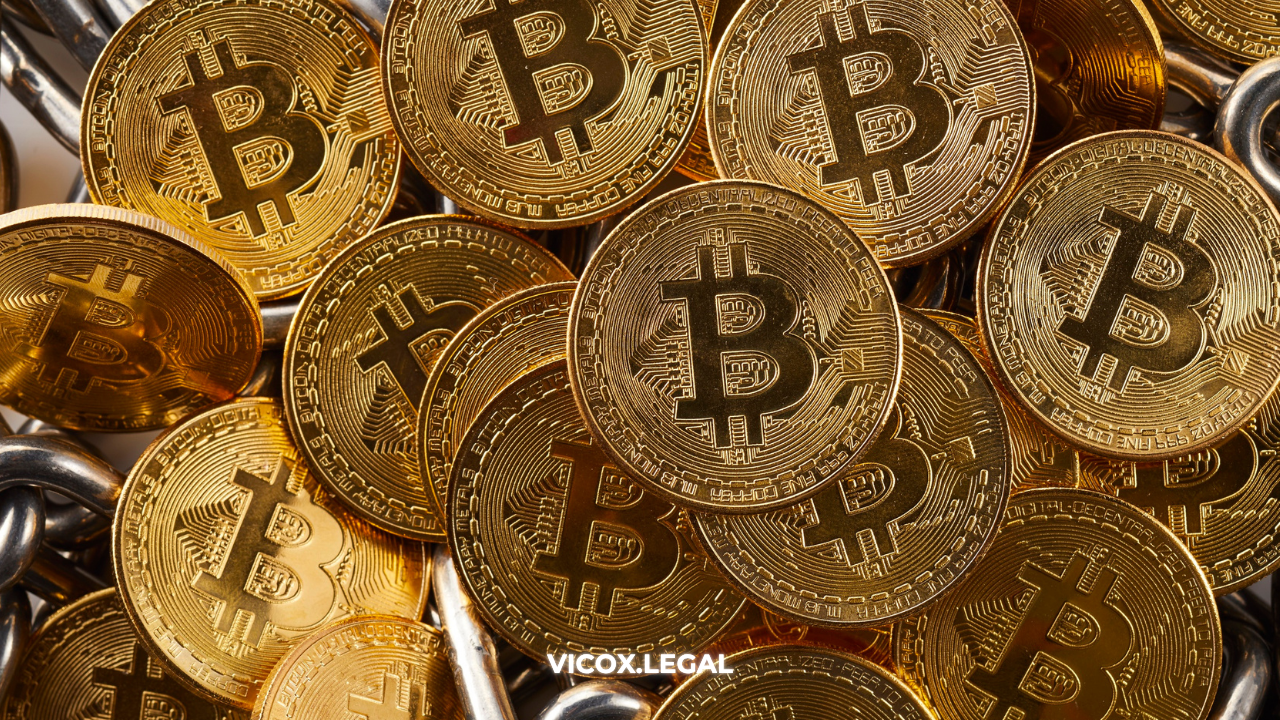
Have you ever heard of Bitcoin? If you haven't, you're about to learn about one of the most revolutionary technologies of the 21st century! In recent years, Bitcoin has caused a stir around the world and has become one of the hottest topics among investors, entrepreneurs and even governments. But why is everyone talking about it, what makes this cryptocurrency so special and why is it changing the way we think about money and investing? In this article we'll tell you everything you need to know about Bitcoin, from how it works to its advantages and disadvantages. We'll also go over alternatives to Bitcoin for those who are looking for other options. Get ready for an exciting journey into the world of cryptocurrency with Vicox Legal as your expert guide.
What is Bitcoin?
Bitcoin is a decentralized cryptocurrency used to conduct financial transactions over the Internet. It is a digital currency, which means it does not exist in physical form like traditional currencies. Instead, it is stored in digital wallets and can be sent and received from anywhere in the world.
One of the most interesting features of Bitcoin is its decentralized nature. This means that it is not controlled by any government or central financial entity, but by the global community of Bitcoin users. The system works through the use of blockchain technology, which records all transactions made with Bitcoin in a public and immutable ledger.
Another important feature of Bitcoin is its limited supply. There will only be a maximum of 21 million bitcoins in circulation at any one time, making it scarce and valuable as demand increases.
Although there is still much uncertainty about the long-term future of bitcoin and other cryptocurrencies, many experts believe they have great potential to change financial systems as we know them today.
How does Bitcoin work?
To understand how Bitcoin works, it should first be noted that it is a decentralized cryptocurrency. This means that it is not backed by any central bank or government and its value is based solely on market supply and demand.
Bitcoin transactions are conducted through a peer-to-peer network and stored in a public record called blockchain. Each block contains several transactions verified by nodes distributed throughout the network. Once the block is confirmed, it is added to the chain, making it impossible to modify or forge any previous transaction without detection.
In addition, to ensure the integrity of the system, users can participate in the mining process by using their computers to solve complex mathematical problems. In return, they receive rewards in the form of newly generated Bitcoins and commissions for processed transactions.
Thanks to its decentralized and transparent nature powered by blockchain, Bitcoin can facilitate secure and instantaneous transfers between people around the world without traditional financial intermediaries.
Why is Bitcoin important?
Bitcoin is important because it represents an alternative to traditional financial systems and their monopoly on issuing currency. Unlike fiat money, Bitcoin is not controlled by any central bank or government, which means that it is governed solely by the laws of supply and demand.
In addition, Bitcoin offers a higher level of security thanks to its decentralized blockchain technology, which guarantees the immutability and integrity of transactions made with this cryptocurrency. This means that there are no intermediaries or third parties involved in the process.
Another important advantage is the ability to make global transactions without geographical restrictions or time limitations. In addition, the fees associated with these transactions are significantly lower than those offered by traditional banks.
On the other hand, there is also some uncertainty surrounding the value of Bitcoin due to its high volatility and lack of government regulation. However, many see this as an opportunity to profit through speculative trading.
Bitcoin is important because it represents an innovative and secure financial alternative based on decentralized blockchain technology. While it presents challenges like any other emerging form of financial technology or investment, many people have found significant benefits from using or investing in it appropriately.
What are the advantages and disadvantages of Bitcoin?
Bitcoin has undoubtedly captured the attention of people around the world. But what are the advantages and disadvantages of this cryptocurrency? Here are some key points to consider.
Advantages:
1. Decentralization: One of the main characteristics of Bitcoin is that it is not controlled by any financial entity or government. This means that users can operate without intermediaries or additional fees.
2. Privacy and security: Transactions on the Bitcoin network are fast, secure and anonymous due to its blockchain technology.
3.Divisibility: Unlike other physical currencies, Bitcoin can be divided into up to 100 million parts (called satoshis), which facilitates exchange between users regardless of the total value involved.
Disadvantages:
1. Volatility: The price of bitcoin can vary drastically in short periods of time, which implies a high risk for those seeking to invest in it as a financial asset.
2. Lack of widespread acceptance: Despite the growth in popularity, not all companies or businesses have adopted the use of bitcoin as a valid method to make payments for products or services.
3. Legal and regulatory problems: Legal ambiguity regarding the use and regulation of bitcoin varies from country to country; while some recognize its validity as an alternative means of conducting economic transactions, others prohibit it completely due to possible risks associated with illicit activities.
How to buy Bitcoin?
If you wish to buy Bitcoin, there are several options to do so. The most common way is through an online exchange house that allows you to exchange your money for this cryptocurrency.
To start, you must open an account on a reliable and secure platform such as Coinbase or Binance. Then, you must verify your identity by providing your personal data and attaching a copy of your identity document.
Once the account is verified and the payment method (bank card or transfer) is added, you can buy Bitcoin directly from the platform following the instructions indicated.
There is also the possibility of acquiring Bitcoins through specialized ATMs located in some cities around the world.
It is important to note that when investing in Bitcoins you must be aware of the high level of volatility that its valuation presents, which can generate gains but also significant losses. Therefore, it is always recommended not to invest more money than you can afford to lose.
Alternatives to Bitcoin
There are many alternatives to Bitcoin on the market. One of the best known is Ethereum, which has a market capitalization very close to that of Bitcoin. Ethereum not only allows transfers between users, but also smart contracts and decentralized applications, giving it great potential to be used as a platform for developing new solutions.
Another popular alternative is Ripple, designed primarily for international transfers and cross-border payments. Ripple focuses on simplifying traditional banking processes through the use of blockchain technology.
Litecoin has also gained popularity due to its faster transaction speed and lower cost compared to Bitcoin. In addition, it is designed to be mined with less specialized hardware than Bitcoin requires.
Finally, it is worth mentioning Dash (formerly known as Darkcoin), a cryptocurrency focused on user privacy and anonymity when transacting.
These are just a few options available on the market today, but there are many other digital currencies emerging every day. The choice depends entirely on the specific purpose for which you need to use them and which one best suits your individual or business needs.
Conclusions
In conclusion, Bitcoin is a digital currency that has gained increasing popularity in recent years due to its security and decentralization. Although there are advantages and disadvantages to using Bitcoin, most people are excited about the potential that this cryptocurrency has. If you are interested in buying Bitcoin or exploring other alternatives, be sure to seek professional advice. At Vicox Legal, we have lawyers who are experts in issues related to cryptocurrencies such as Bitcoin, who can help you better understand how these digital assets work and how you can protect your investments.




